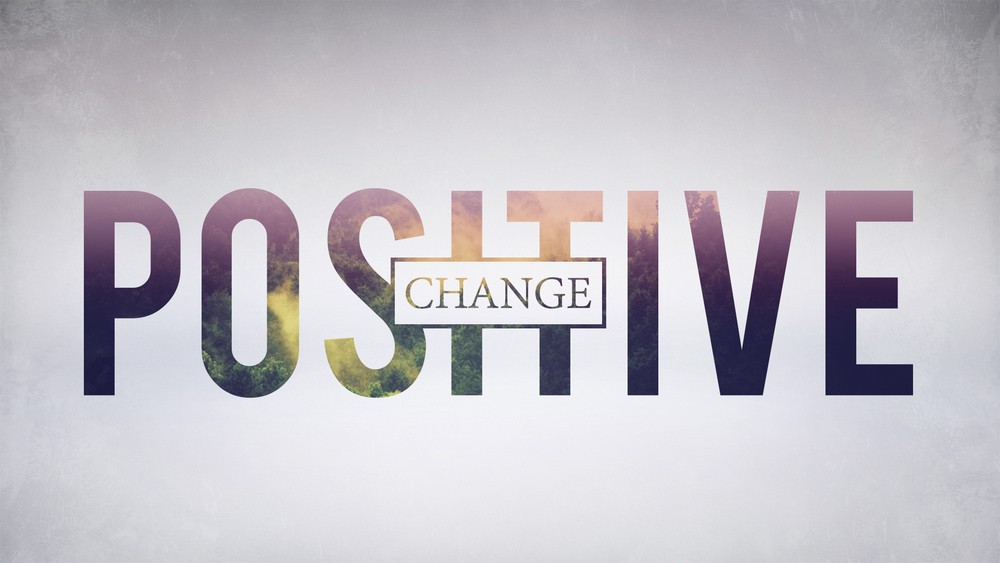2018: My Year Of Positive Change
 June 17, 2019
June 17, 2019
I was in Port Harcourt on study leave when in 2015 the General Elections, which ushered in the present political dispensation, were conducted. At that time, the “hue and cry” and clamour for a CHANGE was deafening. Permit me to recall what an illustrious personality from Port Harcourt City said in the open, “We are all clamouring for CHANGE, but what kind of change do we want? We had better qualify the kind of change we want, so that we will not experience something more negative…” As we begin the New Year 2018, a year we hope to begin another electioneering campaign preparatory to May 29, 2019, the above statement lingers in my memory: we must qualify the kind of CHANGE we want.
Indeed, Nigerians must qualify the kind of CHANGE they want and not allow themselves to be deceived by the so-called “political saviours,” who are experts at making promises to change our lives for the better by delivering the dividends of Democracy, only to discover regrettably that such promises are empty and the dividends of Democracy are at best a will-o-the-wisp! Nigerians must now pursue vigorously and sincerely the kind of CHANGE that is POSITIVE in all aspects of their life—political, social, economic, and religious, among others.
The story of a wise man which we told in our December 2017 Editorial is also pertinent to this issue of positive change. This is because the situation which the wise man’s disciples experienced in their country at that time, which prompted them to test the wisdom of this wise man, is similar to our present experience in Nigeria. We may now read the story and pay keen attention to how he resolved their issue.
There was a wise man named Confucius who lived Four Hundred years before the birth of Christ. The lifestyle of this man was admired by all who came in contact with him; indeed, some of them became his disciples. One day, his wisdom was tested. The story goes like this:
Confucius was sitting under an oak tree in the cool of the day, thinking. Then came the sound of footsteps. Upon looking up, what did he see? Scores and scores of his followers standing round him, each wearing a disturbed front. When he asked what the whole trouble with them was, one of them stepped forward and, opening his mouth, spoke in this manner, “Master, the society is in total chaos. Nothing works right anymore. Man is in absolute state of anarchy, of disorderliness, of meaninglessness, of foolishness, of selfishness, of lawlessness, of laziness, of hopelessness. Yes, man has become a war monger, a sex monger, a money monger! (And I add, a power monger, a beast unto his fellow man, a murderer!) Please, wise master, help us, redeem us. What shall we do? Answer us!”
Confucius answered calmly and with certitude, saying, “The solution is simple—it lies in the rectification of names. When the leader is truly leader, when the lawyer is truly lawyer, when the doctor is truly doctor, when the soldier is truly soldier, when the teacher is truly teacher, when the student is truly student, when the policeman is truly policeman, when the husband is truly husband, and the wife is truly wife, and the child truly child…then, and only then, shall society be restored” (Fr. Nicholas N. Obi, This Odd World: Spotlighting Nigeria’s Blindspots, Lagos: Joe en Jude, 1987, pp. 24-25, paraphrased).
This solution proffered by Confucius is nothing but a “Positive Change”. Thus, as we prepare for elections in 2019, this year is the right time for the electorate to begin to think of voting not just for a “CHANGE”, but for a “POSITIVE CHANGE”. The warning given to Nigerians in 2015 by that senior citizen of Port Harcourt City that Nigerians needed to qualify the kind of change they wanted, must now be heeded. This is the time to qualify the change: “WE WANT A POSITIVE CHANGE”. Not just in words, but Nigerians must show in their actions that they demand a positive change from our political leaders.
At this juncture, I subscribe to Mr. President’s warning statement, repeated regularly over the television (NTAi) that Nigerians should avoid “Hate Speech”. According to him, “hate speech” is capable of inciting crimes and giving rise to genocide. It can cause ethnic and religious bigotry; it can bring about inter-tribal and clannish clashes. It can initiate and enhance long-term enmity between members of the same community, even among family members. It can lead to family vendetta. In a nutshell, “hate speech” always causes division or disunity among people. “Hate Speech” cannot bring about positive change; it is only “Love Speech” that can initiate and promote positive change. This is because “Love speech” can unite. Thus, in this Year 2018, electioneering campaigners should avoid “hate speech”; they should avoid directing “abusive language” at any person, not even at their opponents, whom they consider as their enemies. Rather, they should know that an “opponent” is “a friend at the opposite side”, and not necessarily “an enemy”. That is why my new year’s resolution is “to initiate and promote ‘positive change’ in all aspects of my life”. Using Immanuel Kant’s expression in his Categorical Imperatives, I recommend that my New Year’s Resolution be ‘universalized’. In other words, I propose that all Nigerians should take as their new year’s resolution the candid desire “to initiate and promote ‘positive change’ in all aspects of their life”. Positive change can bring about the death of economic recession; it can move the nation from economic recession to economic prosperity.
Positive change must begin with our political life. Our political leaders should lead by concrete examples. They should not only utter by words of mouth that they have the welfare and wellbeing of the people at heart; they should be seen as actually carrying out projects and programmes that promote these virtues. Concerning our political life, Jesus exhorts our political leaders to practise Servant-Leadership (Mk.10:45), not “Master-Leadership”. From the above warning, two facts must be understood: the first is that leadership is for service; secondly, it is the pagans who practise “master-servant” leadership. In other words, only the pagans use their leadership positions to oppress their subjects, by always making their authority felt by the people. Our Lord warns that this must not happen among present-day leaders. Unfortunately, it is still happening in our times.
Closely related to “servant-leadership” is “obedient-followership”. If it is obvious to the citizenry that their leaders are honestly rendering services to them, that they are making frantic efforts to deliver the dividends of Democracy, such leaders will certainly enjoy the maximum cooperation of their subjects. If the contrary is the case, there shall be disorder and chaos. At best, there shall result what I refer to as “forced obedience” from the followers; and this is no obedience at all. This issue can be narrowed down to the family. In the biological family setting, for instance, parents are ‘leaders’ to their children, while children are ‘followers’. Do parents practise servant-leadership towards their children or do they manifest a domineering attitude? Do Children obey their parents as their God-given leaders, whose good examples they should emulate? Before parents begin to criticize our political and even religious leaders, they must first examine themselves to see whether they discharge their responsibilities towards their children. Are the attitudes of parents worthy of emulation by their children? Similarly, children should also examine the degree of their obedience towards their parents before they criticize the government and Church ministers. This is a major area of positive change. This is because, as soon as bad-parenting changes to good-parenting, and bad-leadership changes to good-leadership, it will affect positively other aspects of our life.
Another area where positive change is seriously needed concerns the issue of embezzlement of public funds. This must be avoided, especially by those whose assignment involves handling public finances. They must avoid the temptation of keeping for themselves monies meant for others, funds meant to execute projects that promote the common good.
It is no longer news that owners of petrol stations in our country deliberately hoard this essential commodity, especially during festive period, specifically at Christmas and New Year. Christmas celebrations occur at the tail end of the last month of the year. This festival usually brings together family members and friends, majority of whom necessarily travel home, to the villages to celebrate Christmas with their loved ones. Thus, it affords family members the opportunity to re-unite and even hold family meetings where important issues are discussed. In order to maximize profit, owners of petrol stations and other fuel dealers hoard this commodity, thereby causing artificial scarcity. For there to be a positive change, those concerned must put an end to this bad attitude. If Christmas festival is a joyful celebration, as people are often heard saying to one another “Merry Christmas!” how can this joy be experienced when one has to queue for as long as two to three days in order to buy petrol to move around? Is that joy not short-lived? The Federal Government should make it her New Year’s resolution to put an end to this very ugly situation, by nipping it in the bud as soon as fuel scarcity is looming. The scarcity experienced in December 2017 is better left unsaid. The suffering of the masses at that period is similar to slavery. This should never have been so!
For positive change to be a reality this year 2018, wastage or mismanagement of human and natural resources must be avoided by those concerned. There abound in Nigeria alone more than Ten Million unemployed but employable youths, most of whom have concluded their Service Year (NYSC), but are awaiting employment. This I consider as wastage of human resources. As a matter of urgency, the Federal Government should make it a priority to create job opportunities for them. If this is done, armed robbery and kidnapping shall be drastically reduced. Similarly, all tapped natural resources should be managed in such a way that they will be beneficial to all Nigerians. Those that have not been tapped should be given attention, so that nothing gets wasted. By so doing, there will be enough for all. Wastage of financial and natural resources was one of the reasons adduced last year by Mr. President as being responsible for the on-going economic recession.
“Honesty, Transparency and Accountability” should be the watchword of every Nigerian. It is obvious that there cannot be positive change in reality if Nigerians are not honest, transparent and accountable. The importance of these virtues for development speaks volume!
To promote positive change in 2018 and beyond, all concerned citizens should avoid cheating, either in businesses, contract awards or in examinations. Examination malpractice and plagiarism must be avoided by students at all levels. Husband and wife must not cheat on each other. “You cannot promote positive change by cheating on your spouse”. In fact, it is unjust to cheat on your spouse.
Finally, those concerned must make restitution for stolen goods. Zacchaeus, a Chief Tax Collector, is a typical example. Scripture tells us that “Zacchaeus stood up and said to the Lord, ‘Listen, sir! I will give half my belongings to the poor, and if I have cheated anyone, I will pay him back four times as much’”(Lk. 19:8). In this regard, I must commend Mr. President’s desperation about recovering huge sums of money looted by past politicians. If the monies eventually recovered are wisely utilized, the on-going economic recession will be reversed. Let us make “POSITIVE CHANGE” our goal this year and always!
By Rev. Fr. Mark Ajiga
 Guy Wilkins
Guy Wilkins Larry Reed
Larry Reed Roxanne Holland
Roxanne Holland Bridget Kennedy
Bridget Kennedy Sally Mendoza
Sally Mendoza